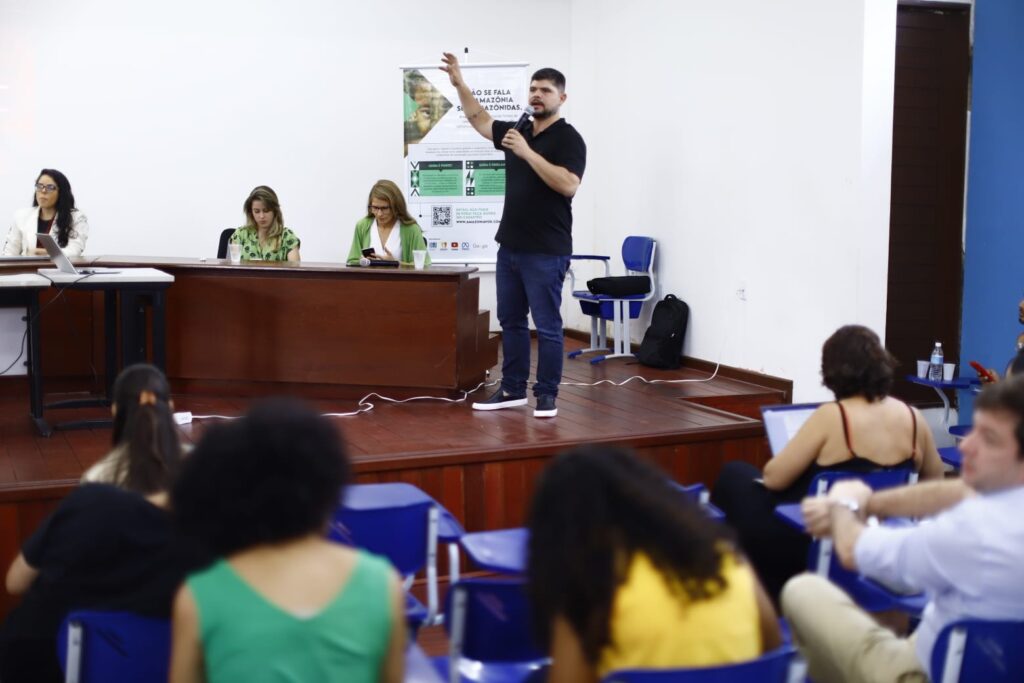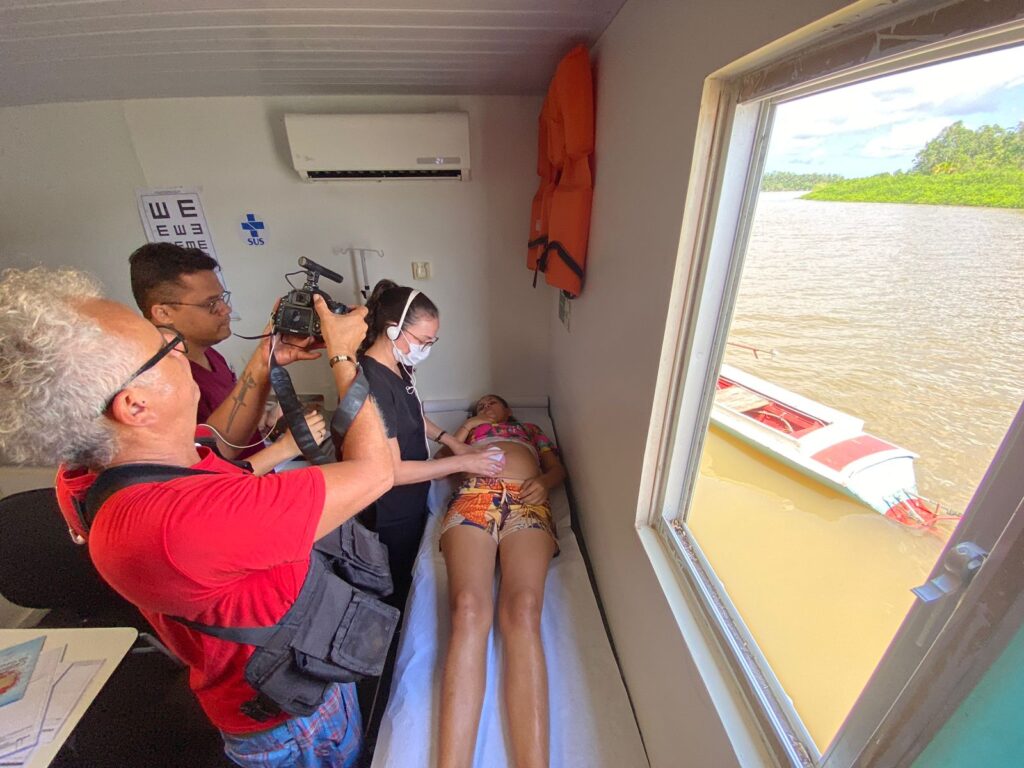A newly launched platform seeks to connect communication professionals and experts from the Brazilian Amazon with journalists and media from other regions. With a database of sources and a pool of freelance journalists based in the nine Brazilian Amazonian states, Amazônia Vox enables stories about the forest and the region to be told from within the region, generating visibility and opportunity for Amazonian professionals and their perspectives.
Daniel Nardin, journalist and founder of Amazônia Vox, told LatAm Journalism Review (LJR) that he has always positioned himself as a source of contacts in the Amazon for journalists from other regions. Nardin lives and works in Belém, capital of the Amazonian state of Pará, but spent some time in Brasília, where he worked as a parliamentary aide.
"We journalists are, above all, colleagues, so I always made myself available to journalists with whom I had contact in Brasília by saying 'if you need anything from here in Pará, let me know and I'll pass it on.' I would always help out and pass on contacts when a colleague needed someone to talk about a certain subject, or when someone told me 'Daniel, I need a photographer in Alter do Chão,' [district of Santarém, in Pará] for example," he said.
This network of contacts cultivated throughout his career and the current global focus on the Amazon were some of the motivations for Nardin to develop Amazônia Vox, out of a desire to do something "purposeful," he said.

Daniel Nardin presented Amazônia Vox at the Amazon Dialogues event on Aug. 4, 2023. (Courtesy / Thiago Gomes)
"I believe there is good faith and an intention on the part of journalists from outside the Amazon to get to know more researchers and sources from here, but the contact is not so simple, these are people who are not so well known. So I thought 'what if there was a place that could bring these people together, this knowledge base, with a certain ease, so that journalists could access it?' We know that a journalist's address book is everything, but not everyone has this," he said.
The beta version of the platform's website has been live since the end of June, with open forms for communication professionals and specialists from various fields of knowledge to register to be included in the bank of freelancers and sources.
So far, there are 332 freelance journalists and 598 sources registered, from all the states of the Brazilian Amazon, Nardin said. He explained that, in addition to self-registration, around 60% of the sources were registered by the Amazônia Vox team. They carried out an active search on the websites of universities and other institutions in the region to find experts on various topics and included their contact information, which was already public on other websites, in the platform's database.
Nardin invited journalists from nine Amazonian states to be "ambassadors" for Amazônia Vox in each state. They have been working to publicize the platform so that more professionals and specialists know about the project and sign up. And also so that more journalists and news outlets know about the platform and use it to find sources and professionals in the Amazon.
The official launch of Amazônia Vox took place during the Amazon Dialogues, an event that preceded the Amazon Summit, which took place in Belém at the beginning of August. During the Summit, Nardin heard from people who referred the platform to colleagues looking for freelancers in the region and also from professionals who were hired after their contact was found on Amazônia Vox.
"There's a WhatsApp group of journalists who went to the COP [United Nations Conference on Climate Change, COP 27, which took place in Egypt] last year, a group of journalists who work in the environmental field. One person wrote: ‘Guys, I urgently need a photographer in Belém.’ Another person, whom I also don't know, replied 'Look, I went to this website [Amazônia Vox] and found it.' When I saw that happen, I thought 'that's it, it's working.' And several colleagues spoke to me there, during the Summit: ‘Thank you, Daniel, for the recommendation.’ I said 'Hey, did I make the referral?' ‘It's just that the person got my contact information through Amazônia Vox,'" he said.
In addition to Brazil, the Amazon encompasses seven other countries: Bolivia, Colombia, Ecuador, Guyana, Peru, Venezuela, and Suriname. Nardin said that he would like to make Amazonia Vox a pan-Amazon platform, but that first he wants to consolidate it among Brazilian Amazonians. He also intends to translate the platform into English by the end of this year, broadening the scope of the project to meet global interest in the Amazon.
In addition to the database of sources and freelancers, Amazônia Vox will also produce and publish journalistic content from and about the Amazon region. Nardin recently underwent training in solutions journalism with the Solutions Journalism Network (SJN) and became an SJN-certified teacher. He intends to apply this approach to the feature stories produced by Amazônia Vox and highlight how Amazonian populations have developed solutions to the problems they face.

Behind the scenes of a story on prenatal care in the Amazon that will be published in October in Amazônia Vox. (Courtesy / Daniel Nardin)
The intention is to make Amazônia Vox "a benchmark in Brazil for solutions journalism from the Amazon region," Nardin said. The first feature story, which will be published later this month, will be about combating misinformation about climate change in the Amazon. In October, an investigation into prenatal care in the region will be published, and in November, a special on the bioeconomy.
The stories will be produced by freelancers whose contacts are available on the platform, so it can also be a showcase for their work, Nardin explained.
These stories were financed by grants from international foundations, which is one of the project's financing strategies. The International Center for Journalists (ICFJ) is one of the institutional partners in the development of Amazonia Vox, through the Pamela Howard Forum for Global Crisis Coverage.
Nardin stressed the importance of journalists reporting on the problems affecting the Amazon region, but noted that this is "only part of the story."
"There are many local initiatives responding to local challenges. By giving visibility to this, we can show that there are other stories here, which need more support to scale," he said. "Then we start to work and defend the idea that yes, there are a lot of problems here, but there are also a lot of solutions being developed. You can't come from outside with the idea that we're going to solve the Amazon's problems. It's better to first get to know what's being done here and see how to improve on it."
Banner image: Behind the scenes of a feature story on prenatal care in the Amazon. (Daniel Nardin / Amazônia Vox)